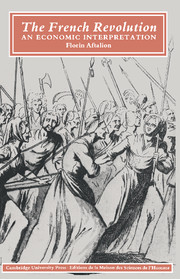Book contents
- Frontmatter
- Contents
- List of figures
- Chronology
- Acknowledgements
- Introduction
- 1 The fiscal crisis
- 2 The French economy at the end of the ‘Ancien Régime’
- 3 1789
- 4 The ‘assignats’
- 5 The finances of the Constituent Assembly
- 6 The rising cost of living, anarchy and war
- 7 The seizure of power by the Mountain
- 8 Economic dictatorship
- 9 ‘Dirigisme’ in retreat
- 10 The French Revolution: economic considerations
- Appendices
- Notes
- Select guide to further reading
- Index
6 - The rising cost of living, anarchy and war
Published online by Cambridge University Press: 05 June 2012
- Frontmatter
- Contents
- List of figures
- Chronology
- Acknowledgements
- Introduction
- 1 The fiscal crisis
- 2 The French economy at the end of the ‘Ancien Régime’
- 3 1789
- 4 The ‘assignats’
- 5 The finances of the Constituent Assembly
- 6 The rising cost of living, anarchy and war
- 7 The seizure of power by the Mountain
- 8 Economic dictatorship
- 9 ‘Dirigisme’ in retreat
- 10 The French Revolution: economic considerations
- Appendices
- Notes
- Select guide to further reading
- Index
Summary
The flight of the King, as well as throwing France and Europe into confusion, had the paradoxical consequence of reviving for a time the fortunes of the moderates, who favoured a property-based constitutional monarchy. The Constitutional Assembly, by endorsing (on 15 and 16 July 1791) the idea that the King had been abducted, absolved Louis XVI of all blame. The republican demonstration, held a short time later on the Champ de Mars, was ruthlessly suppressed. One might have supposed that the Revolution had ended.
The Feuillants, who had just broken with the Jacobins, formed the moderate wing of the Legislative Assembly, which met first on 1 October 1791, and they seemed to be numerically dominant. Out of a total of 650 members elected, 264 had joined the new club, with only 136 aligning themselves with the Jacobin club. But the Constituent Assembly had left a truly explosive situation. The country's financial and administrative condition had never been so chaotic; the ill–timed issues of assignats were beginning to have their destructive effects and anarchy and civil disobedience were rife.
Once Robespierre had moved that the members of the Constituent Assembly could not be re-elected, new men succeeded them, but they were necessarily inexperienced in government and wholly unprepared to tackle the kind of situation which they had been bequeathed. Many of them were advocates and lawyers and were therefore completely uninterested in economic problems, which were so grave in the period just then beginning. They took no steps to take the situation in hand.
- Type
- Chapter
- Information
- The French RevolutionAn Economic Interpretation, pp. 102 - 118Publisher: Cambridge University PressPrint publication year: 1990



